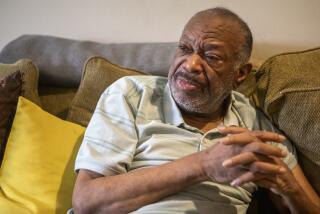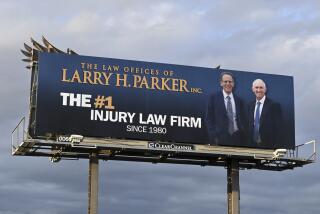Joe Lumer dies at 62; chief executive of L.A. parking lot firm
Joe Lumer, who was born in a Holocaust-survivors camp in Germany and went on to run a sprawling parking-lot empire that includes 75 Joe’s Auto Parks in downtown Los Angeles, drowned this week in Argentina. He was 62.
Lumer, a Brentwood resident who was vacationing with his wife, Esther, in Buenos Aires, did not return to their hotel from an early morning walk Monday, said Gilad Lumer, the eldest of their three sons. His body was later found in the Rio de la Plata, the river on which the city sits.
Circumstances of the drowning are unclear, Gilad Lumer said Friday, but authorities have ruled out foul play. The family was awaiting word of when the body would be returned from Argentina.
“He was just a very genuine person, and very down to earth,” his son said. “Everybody who knew him automatically liked him and respected him. He was very easy to get along with and relate to, and he related to everybody.”
Joe Lumer, a Holocaust researcher and the author of two books, was better known as chief executive of the L&R Group of Companies, which operates Joe’s Auto Parks and WallyPark. The company recently sold several of its other holdings, including Network Parking, System Parking and Five Star Parking.
Although some thought Lumer was the namesake for the Joe’s Auto Parks that dot downtown L.A., the company actually was named for an uncle who founded the family business decades ago. But the younger Joe Lumer was the one widely credited with transforming the firm from a local business into one operating in cities and major airports in six states.
After World War II, Lumer’s family began buying up parcels in downtown Los Angeles and paving them as surface parking lots that, by some estimates, grew to encompass 10,000 spaces. In recent years, some of the lots have been sold and developed as condominium complexes.
Throughout his career, Lumer maintained a lower profile — and higher standards — than some others in his highly competitive industry, said Los Angeles County Supervisor Zev Yaroslavsky, a friend of 35 years.
“In a word, Joe was a human being, just a decent human being,” he said. “In a business that is cutthroat and dog-eat-dog, he stood apart. He didn’t pick fights and he always conducted business honorably. For me, it’s a personal loss. But it’s also a loss for the business community of Los Angeles.”
Joseph Lumer was born in 1948 in a displaced-persons camp in Heidenheim, Germany, according to Michael Berenbaum, a longtime friend and a Holocaust scholar at American Jewish University in Los Angeles.
“He grew up in Berlin in the postwar years and came to the U.S. at age 8, first to Detroit and later to California,” Berenbaum said.
Lumer moved to Israel after college “and spent a considerable amount of time on a kibbutz,” an agriculture collective where he met his wife. Besides Gilad, the couple had two sons, Rayee and Nitzan.
“He was a hulk of a guy with long, curly hair and a beard who was very comfortable working out in the fields,” Berenbaum said. “He came back here, essentially, when his father got ill and died. So he took over the parking business and expanded it nationally.”
While others knew Lumer for his business acumen, Berenbaum said his friendship with him grew out of their shared interest in the Holocaust.
He said few knew that Lumer was so deeply involved that he wrote two books related to the subject, including “Noah the Water Carrier,” a collection of short stories depicting the lives of Jews and gentiles living together in a small Polish city in the 1930s.
“He was a man who seriously pursued his writing,” said Berenbaum, recalling one research trip they took together to Eastern Europe.
“He was interested in seeing everything, knowing everything, visiting everything and meeting everyone — from the high-brow elites to the street workers and janitors,” he said. “In that sense, he was a marvel.”
Berenbaum, a former top executive of the U.S. Holocaust Memorial Museum in Washington, is scheduled to speak Monday at a 2 p.m. memorial service for Lumer at the University Synagogue, 11960 Sunset Boulevard.
He describes Lumer as someone who gave freely but asked for little in return.
“He was what you dream of in a philanthropist,” Berenbaum said. “He was generous, gracious and participatory, and he made no demands aside from the demands of excellence.”
More to Read
Start your day right
Sign up for Essential California for the L.A. Times biggest news, features and recommendations in your inbox six days a week.
You may occasionally receive promotional content from the Los Angeles Times.







